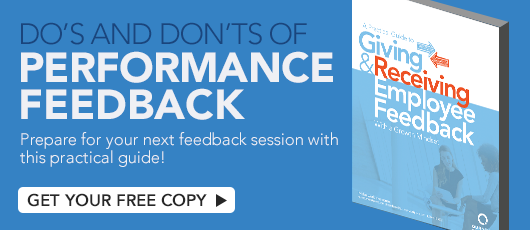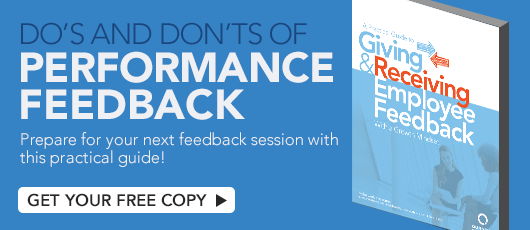Employee Feedback: What It Is and How to Make the Most of It
Giving and receiving employee feedback can be intimidating—especially if it’s negative. But learning to give (and receive) constructive feedback is an essential skill in the manager’s tool belt. And it’s key to engaging employees, motivating employee performance and propelling your organization forward.
What is employee feedback
Employee feedback is the process of giving constructive information or advice to employees and/or leadership based on performance, behavior, or skills in the workplace. Feedback can be given or received:
- Top-down
- Bottom-up
- Peer-to-peer
The goal of employee feedback is to improve performance, ensure standards are met, and help teams function more effectively.
Why does employee feedback matter
Giving and receiving employee feedback is a critical part of effective leadership. Managers who provide frequent and continuous feedback influence their employees to be:
- 5.2x more likely to strongly agree that they receive meaningful feedback
- 3.2x more likely to strongly agree they are motivated to do outstanding work
- 2.7x more likely to be engaged at work
But employees aren’t always getting the feedback they need and it shouldn't wait until your annual review. Instead, feedback must be built into your day-to-day team culture to reap the most benefits.
This is because employees want (and need) feedback to grow. Our research found that the most engaged employees actually prefer feedback to other learning and development opportunities.
Types of employee feedback
Positive vs. Negative Feedback
Feedback can be positive or negative, and both types of feedback are necessary for employee and manager growth.
- Positive feedback reinforces and acknowledges a job well done, focusing on the person’s strengths and encouraging them to stay the course.
- Negative feedback is corrective feedback that points out issues with behavior or performance and helps redirect misaligned priorities.
Whether the feedback is positive or negative, it should always be effective and constructive. Otherwise, you risk leaving your employees feeling criticized, demotivated, and disengaged.
Constructive Feedback
The goal of any feedback model should be to provide constructive feedback. Constructive feedback helps people recognize opportunities for improvement and growth without tearing them down.
To be constructive, feedback should:
- Be specific
- Encourage the employee
- Include observable behavior or performance
- Focus on issues
- Avoid making a value judgement on the person
Peer-to-Peer Feedback
Peer-to-peer feedback is when employees give or receive feedback from their teammates and colleagues. This type of feedback is a powerful way to engage and motivate employees.
In fact, 88% of peer-reviewed employees are happier with their jobs. When employees recognize each other for their achievements and contributions, and provide valuable constructive insights into performance, strengths, and areas for improvement, the entire team thrives.
360 Feedback
360-degree feedback is when employees receive regular feedback from any direction. This could be from leaders and coworkers above them, below them, and at the same level.
360 feedback is especially important to managers and leaders who heavily rely on feedback cycles or processes to identify strengths and weaknesses and track progress and improvements over time. Getting feedback from a variety of levels, departments, or tenures results in better-managed teams and organizational growth.
Informal Feedback
Traditional feedback models typically look like formal annual or quarterly performance reviews and one-on-one employee-manager meetings. However, managers should provide informal feedback too.
Informal feedback is ongoing, real-time advice on performance given to employees outside of formal reviews or one-on-ones. Informal feedback plays an important part in creating a culture of feedback in your organization so your managers and employees receive the coaching and development feedback they need to move forward confidently and productively.
Real-time Feedback
Real-time feedback is when you give spontaneous feedback at any time, for any reason. The feedback can be positive, such as praise for a coworker’s presentation. Or it can be negative, such as explaining to a direct report how their client call could have gone better. The goal is to reinforce a culture of feedback that helps employees get immediate insight on their performance.
Upward Feedback
Upward feedback is when employees give feedback to their managers and leaders. This ensures feedback isn’t just top-down, but goes both ways so that managers learn what their direct reports think and how they can improve their leadership.
Upward feedback can (and should) happen both informally in team meetings, check-ins, or conversations with managers, and during formal one-on-ones and surveys.
How and when to give feedback
Giving (and receiving) feedback isn’t always easy. This is especially true if you need to give negative feedback.
Here are a few principles for making sure your feedback is tactfully given and more easily received.
1. Ask employees if and when they want feedback.
Only 26% of employees strongly agree that the feedback they receive helps them do better work. One way for managers to bridge this gap is to find out if and when employees actually want constructive feedback. While real-time feedback is important, unsolicited constructive feedback can backfire by creating added stress for the person receiving it.
2. Focus on employee strengths.
Employees are 30 times more likely to be engaged when managers focus their feedback on their employees’ strengths. Build performance conversations around positive behaviors and performance to keep the dialogue helpful and encouraging.
Of course, this isn’t to say that you should avoid constructive criticism. But try to balance the negative feedback with positive reinforcement to ensure your advice is motivating rather than demoralizing.
3. Be specific.
Vague feedback will lead to confusion and frustration. When you give feedback, be sure to
- Outline exactly what the issue is (or what the employee did well)
- Make your expectations clear
- Stick to facts
This will help your employees understand and take action on your feedback and reduce confusion and shame.
4. Give timely feedback.
71% of employees prefer immediate feedback, even if it’s negative. While you can’t (and shouldn’t) always give feedback in the moment, it’s important to develop a regular feedback loop with your team.
Our research shows having monthly performance conversations is the optimal cadence for engaging your employees.
How to ask for feedback
Asking for employee feedback takes humility and vulnerability. Here’s a few tips for taking the plunge and opening yourself to employee feedback.
Be direct and conversational.
Don’t be afraid to solicit feedback directly from your employees and coworkers. Use an open-ended question like “What could I do (or stop doing) to improve our team environment?” Open-ended questions help generate honest and thoughtful answers (rather than a simple yes or no).
Listen with the intent to understand.
Listening is key to building trust and taking actionable steps to improve. If you’re meeting one-on-one, take notes on the feedback you receive so you can refer back to it. Ask clarifying questions to make sure you understand the feedback correctly. This will help you apply the feedback correctly and it demonstrates that you are actively listening and respect the person’s opinion.
Communicate and take action.
If you agree with the feedback, fix the problem and let your employees know. When employees see you actually listen and act on their feedback, they will be more willing to provide candid and constructive feedback in the future. If you can’t act on the feedback, make sure to communicate why so your employees aren’t left wondering what happened.
Giving and receiving employee feedback can be tough, but it’s worth it. Use these tips to get started building a culture of feedback today. For more ways to leverage employee feedback in your organization, download our ebook, A Practical Guide to Giving and Receiving Employee Feedback.






